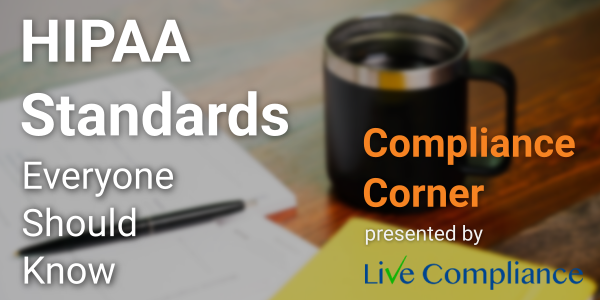
Aug 15, 2022 | Live Compliance, Partner
HIPAA Training Standards Every Business Associate Needs to Know
Per the HIPAA Privacy Rule and HIPAA Security Rule, both Covered Entities and Business Associates, must require HIPAA training for all workforce members that access protected health information (PHI) or electronically protected health information (e-PHI) in any of its forms and should be provided “as necessary and appropriate for the members of the workforce to carry out their functions within the [organization].”
According to the Rule, training must be provided “to each new member of the workforce within a reasonable period of time after the person joins the [organization’s] workforce.” Along with all other annual compliance requirements, HIPAA training is arguably the most important. Your workforce members are your first line of defense in the event of a Breach and must be able to identify your organization’s designated HIPAA Security Officer, and have a firm understanding of the HIPAA Privacy and Security Rule. Training should also highlight the organization’s Technical, Administrative, and Physical Safeguard objective security requirements. It is best practice to provide ongoing security awareness training and, in addition to the mandatory annual training, the Privacy Rule also highlights what’s known as “periodic” training. The goal is to ensure workforce members’ knowledge of HIPAA compliance is not forgotten.
It’s advisable that HIPAA training is given to all employees as new hires during the new employee orientation period, and before new employees are exposed to or work with individually identifiable health information. This includes officers, agents, employees, temporary employees; like students, interns, volunteers, and salespeople. At a minimum, training should cover the basics of HIPAA, the basics of privacy and security requirements and restrictions, and policies and procedures. All new hires need to be provided HIPAA training and a post-test on the material covered within the training course to ensure comprehension of relevant and appropriate HIPAA policies and procedures. Security Officers should be trained on the Breach Notification Rule, Minimum Necessary Rule, and the Organization’s policies and procedures.
The HIPAA Privacy Rule states that “An [organization] must document that the training as described [in the HIPAA Text] has been provided.” Failing to do so will be seen as “willful neglect” and will result in HIPAA violations including monetary penalties as high as $1.5 million dollars. A minor violation may only result in a corrective action plan requirement, whereas a significant data breach attributable to a lack of training will be viewed more seriously.
At Live Compliance, we make checking off your compliance requirements extremely simple.
-
-
- Completely online, our role-based courses make training easy for remote or in-office employees.
- Short informative video training to meet periodic training requirements
- Depending on the size of your organization training may start as low as $79
Call us at (980) 999-1585 or visit us online at www.LiveCompliance.com/ezclaim
ABOUT EZCLAIM:
EZClaim is a leading medical billing, scheduling, and payment software provider that combines a best-in-class product with exceptional service and support. For more information, schedule a consultation today, email our experts, or call at 877.650.0904.

May 5, 2022 | HIPAA, Live Compliance, Medical Billing Software Blog, Support and Training
Your organization’s annual HIPAA Security Risk Assessment and Analysis are only one element of the compliance process, and whether you’re a Business Associate or Covered Entity, your organization must also “implement security updates as necessary and correct identified security deficiencies”. In other words, you must act via a Corrective Action Plan (CAP) following the required risk assessment process.
Here are a few common Corrective Action Plan steps:
- Implement technical policies and procedures to allow access only to those persons or software programs that have been granted access rights to information systems maintained.
- Implement procedures to regularly review records of information system activity, such as audit logs, access reports, and security incident tracking reports.
- Conduct accurate and thorough assessments of the potential risks and vulnerabilities to the confidentiality, integrity, and availability of ePHI.
- Develop a complete inventory of all its categories of electronic equipment, data systems, and applications that contain or store ePHI, which will then be incorporated into its Risk Analysis, and must complete a Risk Management plan.
What happens if I fail to complete my Security Risk Assessment?
Failing to complete your annual Risk Assessment oftentimes means the organization will be required to complete a “robust” Corrective Action Plan (CAP) and often with at least two years of monitoring activity.
Have you ever doubted whether a small billing company or independent physician practice actually ever face penalties?
Well, keep in mind, a Business Associate is a ‘person’ or ‘entity’. This means that there is no billing company too small to have to comply with the Federal HIPAA regulations. Again, if you have not completed an accurate and thorough security risk assessment prior to that, you could also be penalized under ‘willful neglect’. This category alone is $50,000 per violation!
It is important for you to understand that every complaint or potential breach must be investigated by HHS/OCR. If you, a billing company, or another vendor suspects a breach, you must inform the covered entity (your client) and have a breach risk assessment completed to determine key factors and take action.
An EZClaim partner, Live Compliance, will help you to make checking off your compliance requirements extremely simple. They provide:
- Completely online, our role-based courses make training easy for remote or in-office employees.
- Contact-free, accurate Security Risk Assessments are conducted remotely. All devices are thoroughly analyzed regardless of location. Conducting an accurate and thorough Security Risk Assessment is not only required but is a useful tool to expose potential vulnerabilities.
- Complete set of HIPAA Policies and procedures built directly into your portal. Includes actionability, change management documentation, and Incident Response Policy to assist with your Corrective Action Planning. Easily share policies with staff with one click.
- Built directly into your portal, easily monitor where your workforce may be vulnerable with our Dark Web Breach Searches. Easily expose breach sources with ongoing searching of active employee email or domain ensuring continued awareness of potential breach exposure. Weekly automatic email notifications if new breaches are discovered.
- Short, informative, privacy awareness videos covering technical, administrative, and physical safeguards with topics such as ransomware, phishing, the Dark Web, password protection, and more. All delivered monthly with no logins required, they empower your workforce to make conscious decisions when it comes to your organization’s privacy and security.
So, don’t risk your company’s future, especially when Live Compliance is offering a FREE Organization Assessment to help determine your company’s status. For more information, visit their website, e-mail them, or give them a call at 980.999.1585.
ABOUT EZCLAIM:
EZClaim is a medical billing and scheduling software company that provides a best-in-class product, with correspondingly exceptional service and support. Combined, they help improve medical billing revenues. To learn more, visit EZClaim’s website, e-mail them, or call them today at 877.650.0904.
[ Contribution by Jim Johnson with Live Compliance ]

Nov 10, 2020 | Administrative Safeguards, HIPAA, Live Compliance, Medical Billing Software Blog
The noncompliance of HIPAA security rules has had huge consequences for an IT and health information management company.
CHSPSC LLC, (“CHSPSC”) has agreed to pay over $2 million to the Office for Civil Rights (OCR) at the U.S. Department of Health and Human Services (HHS), for the breach of Protected Health Information (PHI). The Business Associate was notified by the Federal Bureau of Investigation (FBI) that it had traced a cyber-hacking group’s advanced persistent threat into CHSPSC’s information system.
After OCR ‘s investigation, it was found that CHSPSC had “longstanding, systemic noncompliance with the HIPAA Security Rule including failure to conduct a risk analysis, and failures to implement information system activity review, security incident procedures, and access controls.” The large health system provided various Business Associate services, including IT and health information management, to hospitals and physician clinics. These violations could have easily been avoided! OCR Director Roger Severino said, “The healthcare industry is a known target for hackers and cyber-thieves. The failure to implement the security protections required by the HIPAA Rules, especially after being notified by the FBI of a potential breach, is inexcusable.”
In addition to the monetary penalty, the Business Associate will be required to complete a “robust” Corrective Action Plan (CAP) with monitoring activity for at least the next two years. CHSPSC will also be required to do the following:
• Implement technical policies and procedures to allow access only to those persons or software programs that have been granted access rights to information systems maintained
• Implement procedures to regularly review records of information system activity, such as audit logs, access reports, and security incident tracking reports
• Conduct accurate and thorough assessments of the potential risks and vulnerabilities to the confidentiality, integrity, and availability of ePHI
All this shows that ANYONE can face HUGE penalties, and they would most likely bankrupt a small billing company or an independent physician practice.
So, based on this specific example, it is VERY important to understand that every complaint or potential breach must be investigated by HHS/OCR. If you, a billing company, or other vendor, suspect a breach, you must inform the covered entity (your client) and have a breach risk assessment completed to determine key factors and take action.
Keep in mind, a Business Associate is a ‘person’ or ‘entity’. This means that ALL billing companies—large or small—need to comply with the Federal HIPAA security rules and regulations. So, if your company has not completed an accurate and thorough security risk assessment, there is a possibility that you could be penalized under ‘willful neglect’. (This category alone gas a fine of $50,000 per violation!)
So then, what can be done to ensure this doesn’t happen to my billing company or my organization? Well, one of EZClaim’s partners, Live Compliance, can make determining your compliance requirements extremely simple:
• Completely online, Life Compliance’s role-based courses make training easy for remote or in-office employees
• Contact-free, accurate Security Risk Assessments are conducted remotely. All devices are thoroughly analyzed regardless of location.
• Policies and procedures are curated to fit your organization, ensuring employees are updated on all workstation use and security safeguards in or out of the office. Update is in real time.
• Electronic, prepared document sending and signing to employees and business associates
So, don’t risk your company’s future, especially when Life Compliance is offering a FREE Organization Assessment to help determine your company’s status. Either call Life Compliance at 980.999.1585, visit LiveCompliance.com to schedule an assessment, or e-mail Jim Johnson.
[ Article contributed by Jim Johnson of Live Compliance ]
———————————-
ABOUT EZCLAIM:
EZClaim is a medical billing and scheduling software company that provides a best-in-class product, with correspondingly exceptional service and support, and can help improve medical billing revenues. To learn more, visit their website, e-mail them at sales@ezclaim.com, or call a representative today at 877.650.0904.

Oct 13, 2020 | HIPAA, Live Compliance, Medical Billing Software Blog, Partner
New HIPAA compliance requirements are coming!
In an effort to make the HIPAA Privacy Rule as easy to understand as possible, the Office for Civil Rights (OCR) has come up with a list of rules that clearly explain what Business Associates are now “directly liable” for. As OCR Director Roger Severino explains, “We want to make it as easy as possible for regulated entities to understand, and comply with, their obligations under the law.” The list consists of ten rules that, if failed to follow, can result in penalties and monetary fines.
[ Note: Check out our previous post to access this list ].
Immediate Requirements:
As we enter the fourth quarter of the year, you may be wondering what immediate requirements should a Business Associate complete before the end of the year?
One of the most important rules also includes information about Business Associates, and their need for proof of satisfactory assurance when the covered entity requests this of them. Satisfactory assurance is crucial, because it ensures the Business Associate is HIPAA compliant, and therefore, must also be in the form of a contract.
The Satisfactory Assurance contract is oftentimes outlined in the form of a questionnaire, and requires the Business Associate to disclose the date of completion for various compliance requirements.
These include distribution and completion of workforce HIPAA training, implementation and distribution of policies and procedures, Business Associate documentation, and completion of an annual HIPAA Security Risk Assessment.
Are You Prepared?:
If a Covered Entity requests this proof from your organization, would you be able to successfully complete it without outdated completion?
If you are uncertain that your organization would be able to easily and efficiently provide that documentation, you may be facing thousands of dollars in fines for each vulnerability!
HIPAA Compliance Myths:
False: The security risk analysis is optional for small providers: All providers who are “Covered Entities” under HIPAA are required to perform a risk analysis. In addition, all providers who want to receive MU, and MIPS incentive payments must conduct a risk analysis.
False: Our office uses the Cloud, so we don’t need a risk assessment: Even if you have a fully HIPAA compliant cloud vendor, your patient data (ePHI and PII) still must go through all your systems to get to the cloud. So, you are still required to perform technical, administrative, and physical security risk analyses.
False: Our EHR makes us compliant, so we’re fine: While your EHR may provide excellent privacy and security features, it definitely doesn’t exempt you from the HIPAA security requirements.
Live Compliance helps their clients meet the ever changing and complex HIPAA State and Federal regulations. They protect the information they are entrusted with, and ensure their clients pass any Health and Human Services audits. If you are unsure or need assistance, call Jim Johnson with Live Compliance at (980) 999-1585.
Live Compliance is a partner of EZClaim, a medical billing software company. For more details about their solutions, visit their website at ezclaim.com.

Sep 10, 2020 | Live Compliance, Medical Billing Software Blog, Partner
So, what’s the best path for HIPAA Compliance? It’s risk analysis.
The HIPAA Security Rule requires covered entities and business associates to ensure the confidentiality, integrity, and availability of all electronic protected health information (ePHI) that it creates, receives, maintains, or transmits.
Conducting a risk analysis—which is an accurate and thorough assessment of the potential risks and vulnerabilities to the confidentiality, integrity, and availability of the ePHI held by an organization—is not only a Security Rule requirement, but is also fundamental to identifying and implementing safeguards that comply with and carry out the Security Rule standards and implementation specifications.
However, despite this long-standing HIPAA requirement, OCR investigations frequently find that organizations lack sufficient understanding of where all of the ePHI entrusted to their care is located.
Although the Security Rule does not require it, creating and maintaining an up-to-date, information technology (IT) asset inventory could be a useful tool in assisting in the development of a comprehensive, enterprise-wide risk analysis, to help organizations understand all of the places that ePHI may be stored within their environment, and improve their HIPAA Security Rule compliance.
How Can You Manage This at Your Organization?
You can try to manage this by yourself, but it would probably be more efficient and superior in implementation if you used an expert. A partner of EZClaim, Live Compliance, is one of those experts. They can help you easily manage, maintain, and assign your hardware and technical inventory to remote or in-office employees.
Do You Have Additional Questions?
If you have any questions about the best path for HIPPA compliance, contact Jim Johnson at Live Compliance (E-mail: jim@livecompliance.com; Phone: (980) 999-1585).
For more on EZClaim’s products, either schedule a one-on-one consultation with their sales team, or download a FREE TRIAL to check it out the software yourself. For additional information right now, view their web site, send an e-mail to sales@ezclaim.com, or contact the sales team at 877.650.0904.
[ Article contributed by Jim Johnson of Live Compliance ]






